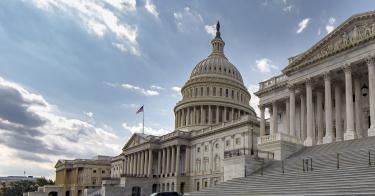No matter what one may think about the events of Jan. 6, 2021, efforts now underway to block certain members of Congress from running for reelection are without merit.
Several voters have filed a challenge in North Carolina to the candidacy of Republican Rep. Madison Cawthorn, seeking to have him disqualified from the ballot. A similar lawsuit has been filed in Wisconsin against Republican Sen. Ron Johnson, Rep. Tom Tiffany and Rep. Scott Fitzgerald, claiming they “are no longer qualified” to seek reelection under the 14th Amendment because they participated in an “insurrection” on Jan. 6, including by supporting objections to the certification of certain electoral votes.
It is noteworthy that not a single protester arrested for criminal trespass, assaulting police officers, and other actions at the Capitol has been charged under 18 U.S.C. § 2383, which makes it a crime to engage in “any rebellion or insurrection against the authority of the United States.” Additionally, no member of Congress has been arrested, charged or indicted for any actions taken on Jan. 6.
>>> Election Law Landscape in Constant Flux Ahead of Midterms
Yet the challengers are claiming that these members of Congress are disqualified from holding office under Section 3 of the 14th Amendment, which was ratified in 1868. Section 3 was aimed at the former Confederacy and said no one could be a member of Congress or hold any federal office who had previously held such a position if they “engaged in insurrection or rebellion.”
But Section 3 also had a unique provision not found in any other amendment to the Constitution. It gave Congress the power “by a vote of two-thirds of each House” to remove this disqualification. Congress did exactly that in two amnesty bills: one in 1872 that kept a limited number of disqualifications for certain members of Congress and the military, and a second in 1898 that got rid of those remaining disqualifications. The plain language of these acts permanently removed the insurrection disqualification in Section 3 from the 14th Amendment.
Additionally, Article I of the Constitution lists the three qualifications required to be a representative and senator (age, citizenship and residency). In 1995, in U.S. Term Limits, Inc. v. Thornton, the U.S. Supreme Court said that no state can impose any additional qualifications on any candidate running for Congress. That would certainly include candidates being forced to prove their innocence regarding any claims that they were somehow involved in the events of Jan. 6.
The Supreme Court also said that a state cannot dress up an additional qualification as a ballot access measure, since that is “an indirect attempt to accomplish what the Constitution prohibits [the state] from accomplishing directly.” Any attempts by officials or courts to refuse to allow a candidate’s name to be listed on the ballot because of his or her alleged participation in “insurrection” clearly fail this test.
Finally, attempts to disqualify candidates because they objected to the certification of certain electoral votes in the joint session of Congress on Jan. 6 have no legal merit. The objections and the subsequent votes on the objections were done in full compliance with the process outlined in the Electoral Count Act of 1887.
>>> Congress Should Ban Foreigners From Interfering in Referenda
The Electoral Count Act provides that an objection can be filed jointly by a senator and a representative and upon such an objection being made, the joint session for the counting of electoral votes is temporarily suspended while Congress debates and votes on the objection. If the objection is voted down, the counting resumes, which is exactly what happened on Jan. 6, 2021.
The effort to have members of Congress barred from having their names on ballots based on claims that they participated in an “insurrection” on Jan. 6 or objected to electoral votes should fail. Congress permanently eliminated the insurrection disqualification in the 14th Amendment in amnesty acts that are still in force today, and the objections to the electoral votes were filed in accordance with federal law.
All of these efforts and threats are a desperate attempt to gain political advantage through unconstitutional actions. They are a waste of time and resources and should be dismissed as such.
This piece originally appeared in MSN.com



